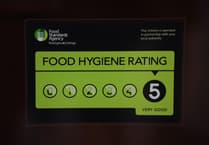SURREY'S under-pressure ambulance service is appealing for help as New Year's Eve approaches.
South East Coast Ambulance Service (SECAmb) is asking for the public’s support ahead of New Year’s Eve – always a busy time for the ambulance service. SECAmb continues to face pressure across both it’s 999 and 111 services, following the long Christmas bank holiday weekend, and demand is expected to remain high across the New Year period.
Last year, the ambulance service answered close to one thousand 999 calls in the seven hours from 8pm on New Year’s Eve.
"We have faced significant pressure on our services for many weeks but we know that New Year’s Eve can bring additional challenges," said executive director of operations, Emma Williams.
"Of course, we know that many people will want to celebrate the new year but we ask that they do this sensibly, understanding the impact their decisions can have on an already stretched ambulance service."

Anyone heading out or celebrating New Year’s Eve is urged by SECAmb to plan their evenings including how they are getting home, looking out for others, and, if drinking alcohol, remembering the impact drinking to excess can have on the ambulance service and wider NHS.
Only call 999 for genuine emergencies, and make use of alternatives when a situation is not so serious, such as using 111.nhs.uk for help and advice.
When to call 999
If you think a patient is suffering from one of the following you must dial 999 for an ambulance:
* heart attack (e.g. chest pain for more than 15 minutes)
* sudden unexplained shortness of breath
* heavy bleeding
* unconsciousness (even if the patient has regained consciousness)
* traumatic back/spinal/neck pain
You should also call for an ambulance if:
* you think the patient’s illness or injury is life-threatening
* you think the illness or injury may become worse, or even life-threatening on the way to the hospital
* the patient needs the skills or equipment of the ambulance service and its personnel




